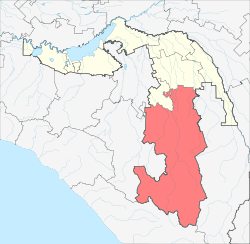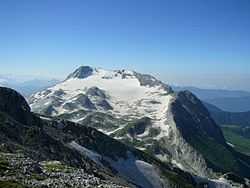Maykopsky District
| Maykopsky District Майкопский район (Russian) Мыекъуапэ район (Adyghe) | |
|---|---|
 Location of Maykopsky District in the Republic of Adygea | |
| Coordinates: 44°31′00″N 40°10′29″E / 44.51667°N 40.17472°ECoordinates: 44°31′00″N 40°10′29″E / 44.51667°N 40.17472°E | |
 Mount Fisht in Maykopsky District | |
 | |
|
| |
| Holiday | Observed in September |
| Location | |
| Country | Russia |
| Federal subject | Republic of Adygea[1] |
| Administrative structure (as of June 2012) | |
| Administrative center | settlement of Tulsky[1] |
| Inhabited localities: | |
| Rural localities | 57 |
| Municipal structure (as of February 2014) | |
| Municipally incorporated as | Maykopsky Municipal District[2] |
| Municipal divisions:[2] | |
| Urban settlements | 0 |
| Rural settlements | 10 |
| Local government: | |
| Head[3] | Yevgeny Kovalyov[3] |
| Representative body | Council of People's Deputies |
| Statistics | |
| Area | 3,667.43 km2 (1,416.00 sq mi) |
| Population (2010 Census) | 58,439 inhabitants[4] |
| - Urban | 30.7% |
| - Rural | 69.3% |
| Density | 15.93/km2 (41.3/sq mi)[5] |
| Time zone | MSK (UTC+03:00)[6] |
| Established | February 21, 1940[7] |
| Official website | |
| Maykopsky District on WikiCommons | |
Maykopsky District (Russian: Майко́пский райо́н; Adyghe: Мыекъуапэ район) is an administrative[1] and a municipal[2] district (raion), one of the seven in the Republic of Adygea, Russia. It is located in the south of the republic and borders with Giaginsky District in the north, Mostovsky District of Krasnodar Krai in the east, the territory of the City of Sochi in Krasnodar Krai in the south, Apsheronsky District of Krasnodar Krai in the west and southwest, and with Belorechensky District of Krasnodar Krai in the northwest. The area of the district is 3,667.43 square kilometers (1,416.00 sq mi). Its administrative center is the rural locality (a settlement) of Tulsky.[1] Population: 58,439 (2010 Census);[4] 58,485 (2002 Census);[8] 58,593 (1989 Census).[9] The population of Tulsky accounts for 18.4% of the district's total population.[4]
History
The predecessor of this district was first established on December 28, 1934 as an administrative division of Azov-Black Sea Krai. It was renamed Tulsky on April 10, 1936. When Azov-Black Sea Krai was divided into Krasnodar Krai and Rostov Oblast in September 1937, Tulsky District remained a part of the former. On February 21, 1940, Maykopsky District was established within Adyghe Autonomous Oblast and on April 28, 1962 Tulsky District of Krasnodar Krai was merged into it.[7]
Divisions
Administrative divisions
Maykopsky District has administrative jurisdiction over fifty-seven rural localities.
Municipal divisions
Municipally, the district is divided into ten rural settlements:[2]
- Rural settlements
- Abadzekhskoye (Абадзехское)
- Administrative center: stanitsa of Abadzekhskaya
- other localities of the rural settlement:
- stanitsa of Novosvobodnaya
- settlement of Pervomaysky
- stanitsa of Sevastopolskaya
- khutor of Vesyoly
- Dakhovskoye (Даховское)
- Administrative center: stanitsa of Dakhovskaya
- other localities of the rural settlement:
- settlement of Guzeripl
- selo of Khamyshki
- settlement of Merkulayevka
- settlement of Nikel
- selo of Novoprokhladnoye
- settlement of Ust-Sakhray
- Kamennomostskoye (Каменномостское)
- Administrative center: settlement of Kamennomostsky
- other localities of the rural settlement:
- settlement of Pobeda
- khutor of Vesyoly
- Kirovskoye (Кировское)
- Administrative center: khutor of Severo-Vostochnye Sady
- other localities of the rural settlement:
- khutor of 17 Let Oktyabrya
- khutor of Dyakov
- khutor of Grozny
- aul of Mafekhabl
- khutor of Oktyabrsky
- khutor of Proletarsky
- khutor of Sovetsky
- Krasnooktyabrskoye (Краснооктябрьское)
- Administrative center: settlement of Krasnooktyabrsky
- other localities of the rural settlement:
- stanitsa of Bezvodnaya
- stanitsa of Dagestanskaya
- settlement of Khakodz
- khutor of Krasny Most
- stanitsa of Kurdzhipskaya
- settlement of Mirny
- settlement of Prirechny
- khutor of Sadovy
- settlement of Spokoyny
- settlement of Tabachny
- Krasnoulskoye (Красноульское)
- Administrative center: khutor of Krasnaya Ulka
- other localities of the rural settlement:
- khutor of Grazhdansky
- khutor of Kalinin
- khutor of Komintern
- khutor of Tkachyov
- khutor of Volny
- Kuzhorskoye (Кужорское)
- Administrative center: stanitsa of Kuzhorskaya
- other localities of the rural settlement:
- khutor of Karmir-Astakh
- settlement of Tryokhrechny
- Pobedenskoye (Победенское)
- Administrative center: settlement of Sovkhozny
- other localities of the rural settlement:
- khutor of Grozny
- settlement of Pobeda
- khutor of Prichtovsky
- khutor of Shaumyan
- settlement of Udobny
- Timiryazevskoye (Тимирязевское)
- Administrative center: settlement of Timiryazeva
- other localities of the rural settlement:
- settlement of Michurina
- settlement of Podgorny
- settlement of Sadovy
- khutor of Shuntuk
- settlement of Tsvetochny
- Tulskoye (Тульское)
- Administrative center: settlement of Tulsky
- other localities of the rural settlement:
- selo of Makhoshepolyana
References
Notes
- ↑ 1.0 1.1 1.2 1.3 Law #171
- ↑ 2.0 2.1 2.2 2.3 Law #283
- ↑ 3.0 3.1 Official website of Maykopsky District. Head of Administration (Russian)
- ↑ 4.0 4.1 4.2 Russian Federal State Statistics Service (2011). "Всероссийская перепись населения 2010 года. Том 1" [2010 All-Russian Population Census, vol. 1]. Всероссийская перепись населения 2010 года (2010 All-Russia Population Census) (in Russian). Federal State Statistics Service. Retrieved June 29, 2012.
- ↑ The value of density was calculated automatically by dividing the 2010 Census population by the area specified in the infobox. Please note that this value may not be accurate as the area specified in the infobox does not necessarily correspond to the area of the entity proper or is reported for the same year as the population.
- ↑ Правительство Российской Федерации. Федеральный закон №107-ФЗ от 3 июня 2011 г. «Об исчислении времени», в ред. Федерального закона №248-ФЗ от 21 июля 2014 г. «О внесении изменений в Федеральный закон "Об исчислении времени"». Вступил в силу по истечении шестидесяти дней после дня официального опубликования (6 августа 2011 г.). Опубликован: "Российская газета", №120, 6 июня 2011 г. (Government of the Russian Federation. Federal Law #107-FZ of June 31, 2011 On Calculating Time, as amended by the Federal Law #248-FZ of July 21, 2014 On Amending Federal Law "On Calculating Time". Effective as of after sixty days following the day of the official publication.).
- ↑ 7.0 7.1 Азаренкова, А. С.; И. Ю. Бондарь, Н. С. Вертышева (1986) [1986]. Основные административно-территориальные преобразования на Кубани (1793–1985 гг.) (in Russian). Краснодарское книжное издательство. p. 180.
- ↑ Russian Federal State Statistics Service (May 21, 2004). "Численность населения России, субъектов Российской Федерации в составе федеральных округов, районов, городских поселений, сельских населённых пунктов – районных центров и сельских населённых пунктов с населением 3 тысячи и более человек" [Population of Russia, Its Federal Districts, Federal Subjects, Districts, Urban Localities, Rural Localities—Administrative Centers, and Rural Localities with Population of Over 3,000] (XLS). Всероссийская перепись населения 2002 года [All-Russia Population Census of 2002] (in Russian). Retrieved August 9, 2014.
- ↑ Demoscope Weekly (1989). "Всесоюзная перепись населения 1989 г. Численность наличного населения союзных и автономных республик, автономных областей и округов, краёв, областей, районов, городских поселений и сёл-райцентров" [All Union Population Census of 1989: Present Population of Union and Autonomous Republics, Autonomous Oblasts and Okrugs, Krais, Oblasts, Districts, Urban Settlements, and Villages Serving as District Administrative Centers]. Всесоюзная перепись населения 1989 года[All-Union Population Census of 1989] (in Russian). Институт демографии Национального исследовательского университета: Высшая школа экономики [Institute of Demography at the National Research University: Higher School of Economics]. Retrieved August 9, 2014.
Sources
- Государственный Совет — Хасэ Республики Адыгея. Закон №171 от 5 мая 2000 г. «Об административно-территориальном устройстве Республики Адыгея», в ред. Закона №97 от 6 июня 2012 г. «О внесении изменений в некоторые Законы Республики Адыгея в связи с принятием Закона Республики Адыгея "Об отнесении посёлка городского типа Тульского к категории посёлков — сельских населённых пунктов"». Вступил в силу со дня официального опубликования. Опубликован: "Советская Адыгея", №156-157, 7 августа 2004 г. (State Assembly of the Republic of Adygea. Law #171 of May 5, 2000 On the Administrative-Territorial Structure of the Republic of Adygea, as amended by the Law #97 of June 6, 2012 On Amending Various Laws of the Republic of Adygea Due to the Adoption of the Law of the Republic of Adygea "On Transformation of the Urban-Type Settlement of Tulsky into a Settlement—a Rural Locality. Effective as of the official publication date.).
- Совет Республики Адыгея. Закон №283 от 30 декабря 2004 г. «О наделении муниципального образования "Майкопский район" статусом муниципального района, об образовании и наделении статусом поселений муниципальных образований в его составе и установлении их границ», в ред. Закона №380 от 30 декабря 2014 г. «О внесении изменений в Закон Республики Адыгея "О наделении муниципального образования "Майкопский район" статусом муниципального района, об образовании и наделении статусом поселений муниципальных образований в его составе и установлении их границ"». Вступил в силу со дня официального опубликования. Опубликован: "Советская Адыгея", №2–5, 12 января 2005 г. (Council of the Republic of Adygea. Law #283 of December 30, 2004 On Granting the Municipal Formation of "Maykopsky District" the Status of a Municipal District, on Establishing the Municipal Formations Within It and on Granting Them the Settlement Status, and on Establishing Their Borders, as amended by the Law #380 of December 30, 2014 On Amending the Law of the Republic of Adygea "On Granting the Municipal Formation of "Maykopsky District" the Status of a Municipal District, on Establishing the Municipal Formations Within It and on Granting Them the Settlement Status, and on Establishing Their Borders". Effective as of the day of the official publication.).
| ||||||||||||||||||||||||